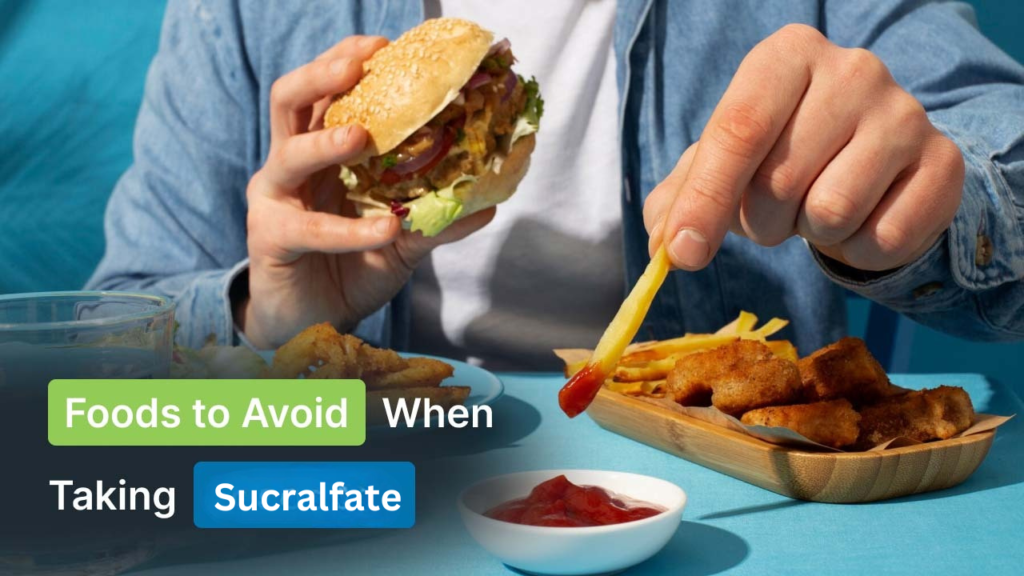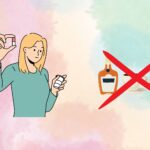Sucralfate, also known by the brand name Carafate, is a medication commonly prescribed to treat ulcers and certain digestive conditions. While effective, sucralfate’s interaction with food and beverages can impact its efficacy. This article provides a comprehensive guide on foods to avoid while taking sucralfate, as well as tips on how to take this medication properly to maximize its benefits.
What is Sucralfate? Understanding Its Purpose and Use
Sucralfate is a medication used to treat and prevent ulcers in the stomach and intestines. It works by forming a protective barrier on the ulcer surface, which helps shield it from stomach acid, allowing it to heal more effectively. Sucralfate is often prescribed for:
- Duodenal Ulcers: To treat or prevent the recurrence of ulcers in the upper part of the small intestine.
- Gastric Ulcers: To protect and aid the healing of ulcers in the stomach lining.
- Gastroesophageal Reflux Disease (GERD): In some cases, to reduce irritation and promote healing of the esophagus.
How Does Sucralfate Work?
Sucralfate works locally by forming a protective barrier over the ulcerated area. It does not reduce stomach acid directly but prevents further damage to the lining, promoting natural healing. To work effectively, sucralfate must come into direct contact with the ulcer. This is why understanding its interactions with food and drinks is crucial.
What Should You Avoid When Taking Sucralfate? Key Foods and Beverages
To ensure sucralfate works effectively, it is important to avoid certain foods and beverages that can interfere with its action:
1. Avoid Taking Sucralfate with Food
Sucralfate should be taken on an empty stomach, at least 1 hour before meals or 2 hours after eating. Taking sucralfate with food can significantly reduce its effectiveness. The presence of food in the stomach may prevent sucralfate from directly adhering to the ulcer site.
- Tip: Plan your doses around your meal schedule to avoid interference.
2. Dairy Products: Milk and Yogurt
While dairy products like milk and yogurt are generally healthy, they can interfere with sucralfate’s absorption. Calcium in dairy can bind with sucralfate, reducing its ability to adhere to the ulcer site.
- Question: Can I take sucralfate with milk?
Answer: No, it’s best to avoid taking sucralfate with milk or any dairy products. Wait at least 2 hours after consuming dairy before taking your medication.
3. Caffeinated Beverages: Coffee and Tea
Caffeinated drinks, such as coffee and tea, can irritate the stomach lining and potentially counteract the healing process. Additionally, the acid in these beverages can interfere with the protective barrier that sucralfate forms.
- Question: Can you drink coffee with sucralfate?
Answer: It is best to avoid coffee when taking sucralfate. If you must have coffee, try to consume it well before or after taking the medication.
4. Alcohol
Alcohol can exacerbate ulcers and irritate the stomach lining, counteracting the benefits of sucralfate. It is recommended to avoid alcohol completely while undergoing treatment.
- Question: Can you drink alcohol while taking sucralfate?
Answer: No, you should avoid alcohol while taking sucralfate to prevent additional irritation and promote healing.
5. Acidic and Spicy Foods
Foods that are highly acidic or spicy, such as citrus fruits, tomatoes, and hot peppers, can irritate the stomach lining. While sucralfate helps protect the ulcer site, consuming these foods may still cause discomfort or delay healing.
- Suggestion: Opt for bland, non-irritating foods like bananas, rice, or plain oatmeal.
What Happens If You Eat After Taking Sucralfate?
Eating immediately after taking sucralfate can reduce its effectiveness. The food can interfere with the medication’s ability to form a protective barrier over the ulcer, delaying the healing process.
How Long After Taking Sucralfate Can I Eat?
It is recommended to wait at least 1 hour after taking sucralfate before eating. This allows the medication to coat the ulcer site effectively.
Can You Drink Liquids After Taking Sucralfate?
Drinking water after taking sucralfate is generally fine, but other liquids should be approached with caution:
- Water: Safe to drink after taking sucralfate.
- Milk and Dairy Products: Wait at least 2 hours after taking sucralfate to drink milk or consume dairy products.
- Coffee, Tea, and Alcohol: These should be avoided immediately after taking the medication to prevent irritation and interference with its action.
Sucralfate Interactions: What to Watch For
Sucralfate may interact with other medications, affecting their absorption or effectiveness. It is crucial to know what can and cannot be taken alongside sucralfate:
1. Antacids and Sucralfate
Antacids may reduce the effectiveness of sucralfate if taken simultaneously. If you need to use an antacid, take it at least 30 minutes before or after sucralfate.
2. Other Medications
Sucralfate may interfere with the absorption of certain drugs, such as:
- Antibiotics (Tetracyclines, Fluoroquinolones): Take these medications at least 2 hours before or 6 hours after sucralfate.
- Thyroid Medications: If you are on thyroid medications, consult your healthcare provider about the timing and interactions with sucralfate.
Can You Drink Coffee with Sucralfate?
While you can technically drink coffee while taking sucralfate, it is not recommended due to its acidity and potential to irritate the stomach lining. If you choose to consume coffee, do so at least 2 hours after taking sucralfate.
Sucralfate and Alcohol: Understanding the Interaction
Combining alcohol with sucralfate is not advised as it may exacerbate ulcers and increase stomach irritation. Alcohol can counteract the protective effects of sucralfate, delaying healing and worsening symptoms.
- Question: How long after taking sucralfate can I drink alcohol?
Answer: It’s best to avoid alcohol entirely while taking sucralfate to allow your body to heal effectively.
Conclusion:
To maximize the effectiveness of sucralfate, it is essential to avoid certain foods and beverages that can interfere with its action. Remember to take sucralfate on an empty stomach, avoid dairy products, caffeinated beverages, alcohol, and acidic or spicy foods. By following these guidelines and understanding the interactions, you can support the healing process and ensure the best possible outcome from your treatment.
Disclaimer: The content on Wellness Derive is for informational purposes only and not a substitute for professional medical advice, diagnosis, or treatment. Always consult a healthcare provider for medical concerns.



